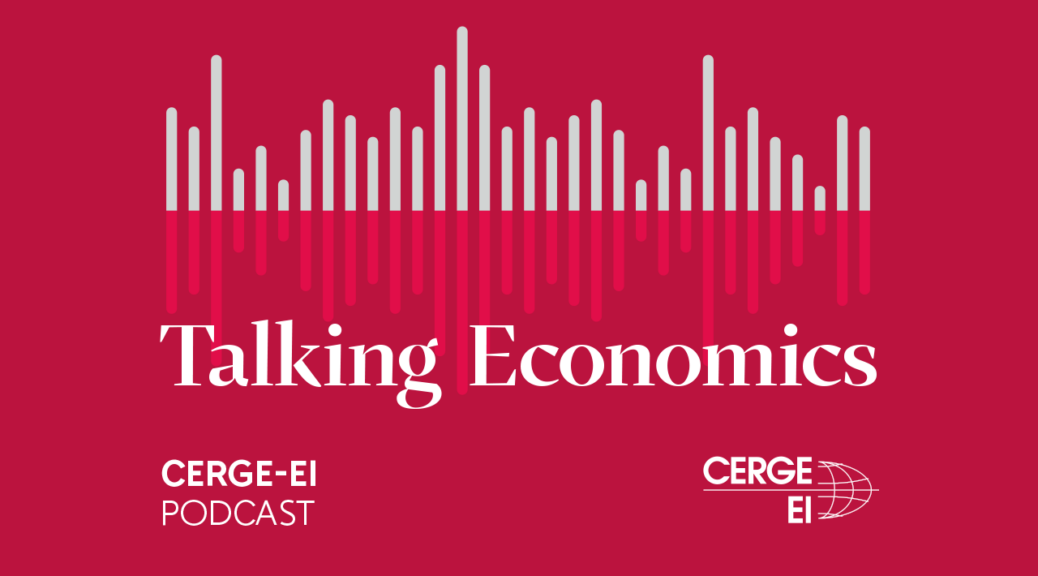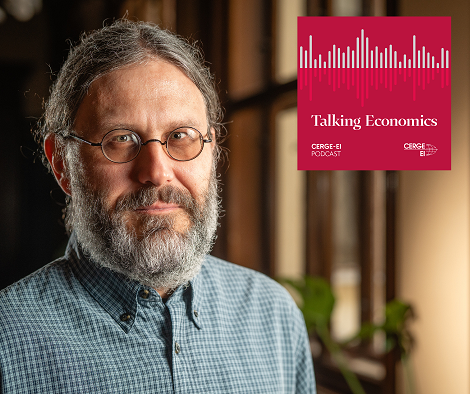In the latest episode of Talking Economics, we sat down with Ctirad Slavík, an Associate Professor with tenure at CERGE-EI, to discuss his research on taxation, the organization of knowledge and production, and the broader economic implications of policy reforms.
In addition to his academic work, Ctirad leads the Economic Impact Working Group within the National Institute for Research on Socioeconomic Impacts of Diseases and Systemic Risks (SYRI), a research center bringing together experts from Masaryk University, Charles University, and the Czech Academy of Sciences. One of his key analyses focuses on evaluating the impact of the 2021 Czech income tax reform.
The Complexities of Capital Taxation
A significant portion of Ctirad’s research is devoted to the optimal taxation of capital, a topic central to public finance. He explains that the best approach to taxation depends on the government’s available policy instruments. Ideally, taxation would be based on individuals’ innate abilities, redistributing wealth accordingly. However, tax codes do not allow discrimination based on personal characteristics such as gender, education, or race. Consequently, governments rely on indirect methods, such as taxing capital, which is predominantly owned by wealthier individuals.
Ctirad’s research advances existing literature by incorporating endogenous wages—meaning that wage levels are not fixed but depend on labor supply and capital distribution. This approach allows for a more comprehensive understanding of how taxation affects both capital accumulation and wage structures.
Should We Tax Robots and Machines?
Another aspect of Ctirad’s work explores the taxation of different types of capital, including automation and machinery. Together with his co-author Hákı Yazıcı, he examines how various forms of capital—such as buildings versus equipment—affect productivity and wage distribution across different skill levels. For example, investments in automation and computers tend to benefit highly skilled workers more than low-skilled ones, potentially increasing wage inequality.
To address this, he suggests that governments consider taxing equipment at higher rates than other types of capital. However, this must be carefully balanced against economic efficiency—over-taxing capital could discourage investment and slow growth. His findings indicate that a well-designed tax policy can achieve both equity and efficiency.
The Role of Progressive Taxation in Knowledge Transfer
Beyond capital taxation, Ctirad has also studied labor income taxation and its influence on knowledge transfer within organizations. In collaboration with Marek Kapička, an Associate Professor with tenure at CERGE-EI, he analyzes how tax progressivity impacts the sharing of expertise in the workplace. Their model suggests that while progressive taxation helps reduce income inequality at the top, it may also unintentionally hinder knowledge dissemination.
The reasoning is simple: when high earners face higher taxes, they may reduce their work effort, limiting opportunities for skill transfer to junior colleagues. This could ultimately widen inequality at the lower end of the wage spectrum by restricting access to mentorship and career development.
Evaluating the Czech Income Tax Reform of 2021
As part of his work with SYRI, Ctirad has analyzed the economic effects of the 2021 Czech income tax reform. This policy reduced taxes for a broad segment of the population while slightly increasing rates for the highest earners. Originally designed as a stimulus measure in response to the COVID-19 crisis, the reform has sparked debate over its long-term fiscal sustainability.
Using macroeconomic models, his team is assessing both the short- and long-term effects of the reform. Their analysis considers how changes in taxation influence labor supply, investment, and wage structures, as well as broader equilibrium effects on capital markets and productivity.
Looking Ahead
Ctirad’s research highlights the complex relationship between taxation, economic efficiency, and income distribution. His findings emphasize the need to look beyond immediate fiscal impacts and consider the long-term structural consequences of tax policies. As governments worldwide grapple with economic inequality and growth challenges, his insights offer valuable guidance for designing fair and efficient tax systems.
To hear the full discussion, tune in to this episode of Talking Economics on Spotify, Apple Podcasts, or YouTube.

